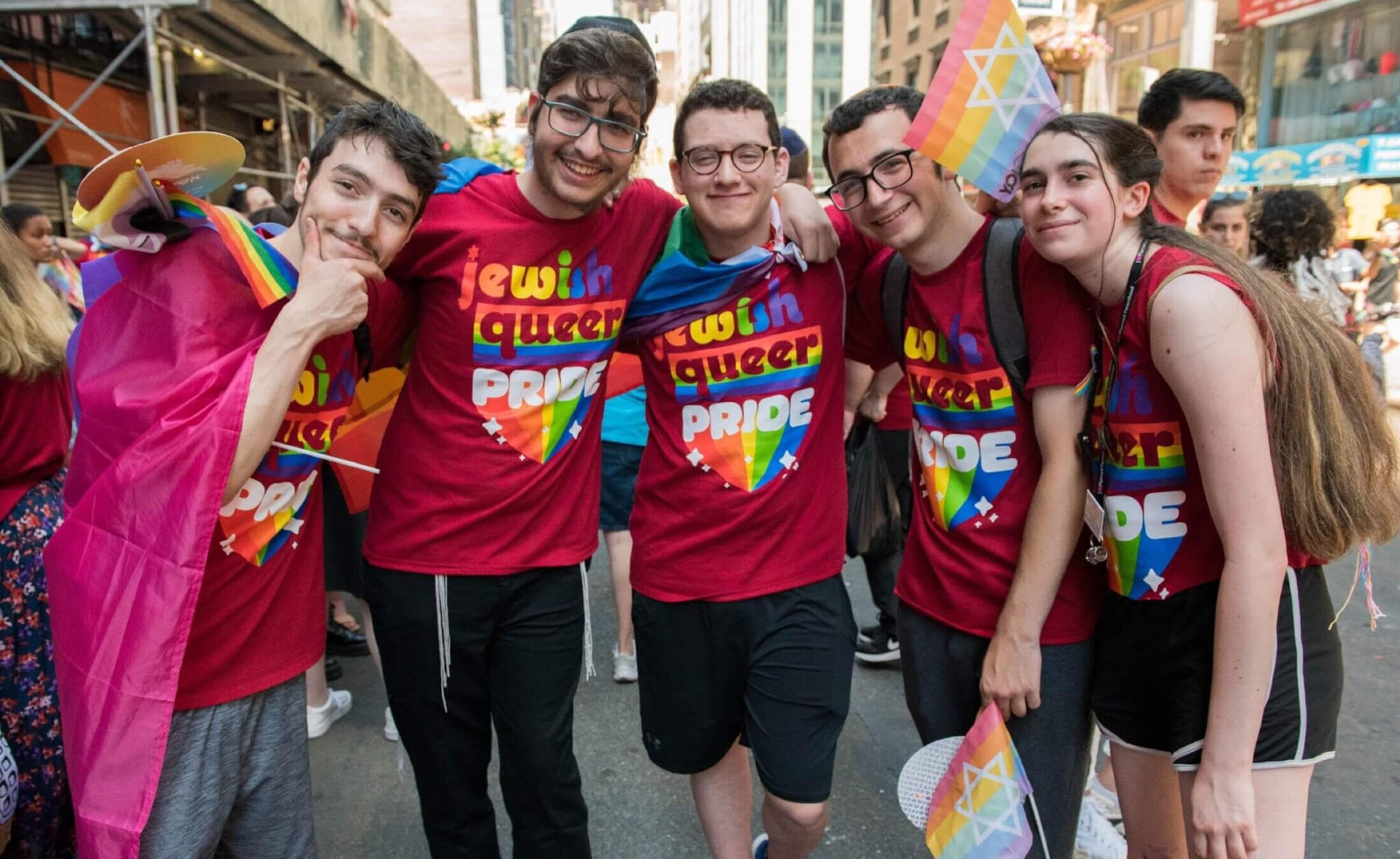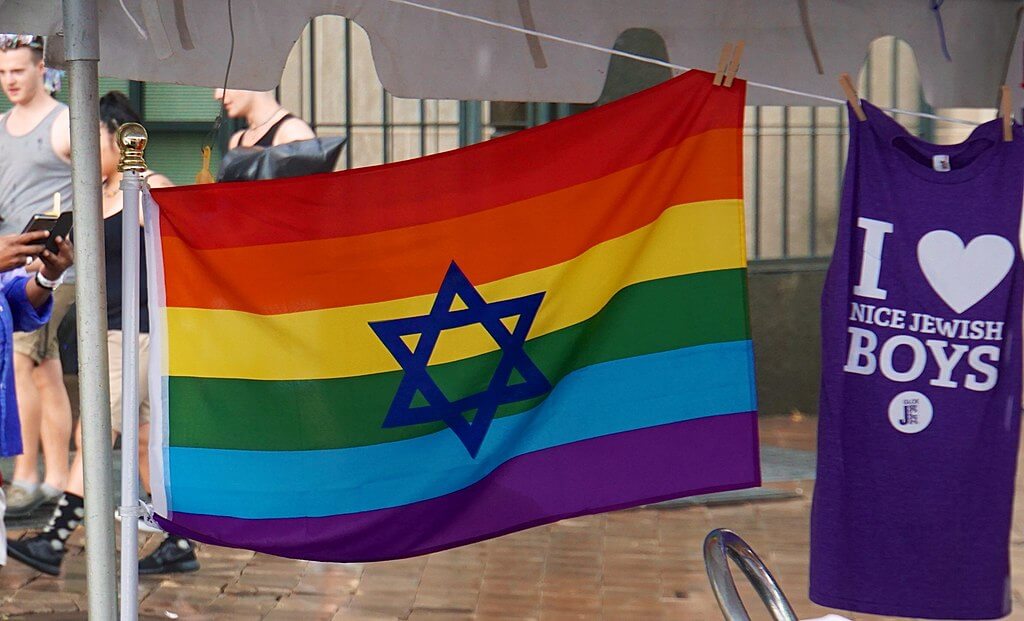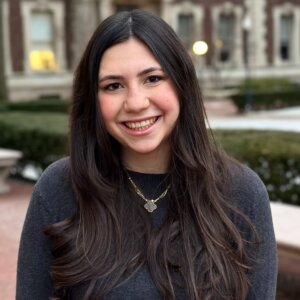‘Non-Zionary’: How some queer Jews are wrestling with Israel
“While I’m a raging Zionist,” said Blake Fonberg, who organizes Shabbat dinners for queer Jews, “it’s important to create a space for Jews who aren’t Zionists.”

Members of Jewish Queer Youth marching in the 2022 NYC Pride March. Courtesy of Jewish Queer Youth
Since Oct. 7, queer Jews — both Zionists and anti-Zionists — have felt unwelcome in places they once felt comfortable.
Many queer Zionist Jews say they’ve been excluded from queer groups where support for the pro-Palestinian cause is expected, and support for Israel — even expressions of sympathy for the victims of Hamas’ attack — is rejected.
At the same time, many queer anti-Zionist Jews — broadly, those who do not believe there should be a Jewish state in what is now Israel — say they’re made to suppress their views in mainstream Jewish institutions and gatherings where a love for Israel is assumed.
But some LGBTQ+ Jewish groups, especially this Pride Month, are taking pains to welcome Jews no matter their feelings about Israel. They hope for a New York City Pride March on Sunday where all queer Jews will feel comfortable marching.
New York-based Jewish Queer Youth, which serves people ages 18 to 23 from Orthodox families, took that tolerant tack after the Celebrate Israel Day parade in the city earlier this month. At the group’s Times Square headquarters, its leaders brought together Jewish young people who had marched in the parade, but also those who had protested it. Rachael Fried, the group’s executive director, had planned a “processing session,” about the event.
Instead the six young people lounged on the colorful couches, made art and caught up with friends: what they usually do at their weekly meetings, which typically draw about 45 young adults . Fried said she understood the desire to talk about anything but the contentious rift between Zionist and anti-Zionist Jews of which they are already painfully aware.
“There’s a huge relief in being able to walk into a space and be your full self and not have to check part of you at the door,” Fried said. “And sometimes that means that you don’t have to explain yourself or defend yourself or argue or debate. Sometimes, it means you can just be.”
Fried said Jewish Queer Youth often applies the Talmudic concept of Eilu v’Eilu — in Hebrew, “both these and those” — to affirm both Jewish and queer values and show Jewish young people that these two identities can live peaceably in one person. In the past months, as “Zionist” has increasingly been used as a slur within progressive groups, including queer ones, and Jews who champion the Jewish state have questioned the Jewishness of those who reject it, the group has applied the same philosophy to the question of Zionism.
This framework, Fried said, encourages young people to engage with those who hold drastically different views on the Israel-Palestine conflict, the current war and the existence of Israel itself.
Other queer Jews, in groups both formal and informal, religious and social, are embracing a similarly welcoming approach. Proponent Blake Fonberg, who lives on the Lower East side and organizes Shabbat dinners for LGBTQ+ Jews, describes gatherings where no one is shunned for their views on Israel as “non-Zionary” — a play on “Zionism” and non-binary, the term for a person who doesn’t identify as strictly male or female.
“While I’m a raging Zionist,” he said, “it’s important to create a space for Jews who aren’t Zionists, because we have to be here for all Jews right now.”
Gay Shabbat
Fonberg has organized more than 20 Shabbat dinners for queer Jews in the year since he and his friends Jakob Bolman and Julia Bretschneider founded Gay Shabbat. More than 600 people have signed up for the dinners — mostly Zionists, Fonberg said.

After Oct. 7, as vitriol mounted against both Zionists and anti-Zionists, Fonberg and his friends decided that they needed to make it clear that Gay Shabbat would welcome all queer Jews.
“We’ve created a space that we could all be together and be here as queer Jews and support each other regardless of Zionism affiliation,” Fonberg said.
To help assure the non-Zionist minority at Gay Shabbat would not feel marginalized, its leaders ask an anti-Zionist member of the group to check the wording on its posts in their group chat, to make sure it would not offend.
But the group, though focused on fostering social connections among Jewish queers, does not avoid talking about Israel and Zionism, and has hosted and co-hosted events which deal with the topic head on — such as a gathering with Rep. Ritchie Torres, a New York Democrat who is both queer and an ardent Zionist, and another with Shabbat 25K, an Israel education initiative.
Zionism and Anti-Zionism
Gillian Gurney, a cantor’s daughter who works in public relations, was inspired to come out through Gay Shabbat. She identifies as a Zionist, she said, because she feels Israel has a right to exist.
She’s also glad Gay Shabbat is a space for queer Jews to embrace their identities regardless of their opinion on the topic.
They’re gatherings “where everyone can exhale for a bit,” she said, and “celebrate all of our identities in one common space.”
That’s something “we don’t get to do often,” she added.
Eliana Rubin, a queer anti-Zionist who holds a master’s degree in educational leadership from Hebrew Union College, and works on diversity, equity and inclusion initiatives, said the efforts Jewish institutions have taken to make queer people feel more welcome should be applied to anti-Zionists too.
Jewish leaders can ask themselves, she suggested: “Is it acceptable and or appropriate to vocalize either Zionist or anti-Zionist beliefs in the space?”
Rabbi Elliott Tepperman tries to send the same message at Bnai Keshet, the Reconstructionist synagogue in Montclair, New Jersey, where he is senior rabbi. The shul has celebrated gay pride and its LGBTQ+ members for decades, he said. But the mostly Zionist congregation also includes some anti-Zionists, and he wants to make sure that they don’t feel excluded at a time when other Jews are doubling down on their commitment to Israel during this “super hard, terribly painful year to be a Jew.”
Since Oct. 7, he has hosted several conversations on the war and Zionism at Bnai Keshet, each of which has drawn dozens of members. He welcomes all viewpoints on Israel. Because Jews, Israelis and Palestinians’ fates are intertwined, he said, “I don’t believe we can afford to have language policing or ideological litmus tests.”
Though many different opinions on Israel and the war are represented within the congregation, he said, he often finds that people — no matter their views — feel they are the only one to hold them. So he invites them to speak up.
“We will be stronger with your voice,” he tells them.
The NYC Pride March
The New York City Pride March this weekend, the largest in the country, will put “non-Zionary” intentions to the test: will queer Jews feel free to march, their views on Israel notwithstanding? Given rising antipathy toward Israel in queer and other progressive movements since Oct. 7, even if LGBTQ+ Jews welcome each other to the parade, will other marchers?

While the march in past years has attracted homophobic protesters, this year, many expect pro-Palestinian protests, and chants and posters that vilify Israel. Some of the more than 15 queer Jews I spoke to in the weeks before the parade, which last year drew 75,000 marchers and 2 million spectators, expressed a nervousness about participating.
Other Pride festivities this year have been disrupted by pro-Palestinian protesters, who have come together under the slogan “No Pride in genocide.” But anti-Israel sentiment at Pride events go back years. The DC Dyke March in June 2019, for example, banned “national symbols,” specifying that Israeli and American flags were not welcome.
Ethan Felson, Executive Director of A Wider Bridge, which connects queer Jews in the U.S. with those in Israel, said that he expects more queer Jewish people to show up to the parade this year than in the past.
“LGBTQ Jews are part of the queer community, proudly so, and it is incumbent upon Pride leaders, public safety, and others to ensure our safety when we do show up,” he said.
NYC Pride has hired a private security firm and trained 1,200 volunteers to help keep the event safe.
Jewish Queer Youth — along with five other Jewish organizations, some focused on LGBTQ+ issues and some just supportive of queer Jews — will host a “Jew York Pride” rainbow bagel brunch and watch party on the day of the march, and also send a contingent.
Unlike many other LGBTQ+ organizations in the U.S., NYC Pride, the march’s organizer, has not issued a statement on the Israel-Hamas war. Nor has it banned any flags at the parade. The Israeli Consulate signed up to march, as it has in past years.
“Since our inception, now going on 40 years, the march has prioritized inclusivity and free speech,” said Sandra Pérez, the group’s executive director.
March organizers don’t expect everyone there to hold the same views, she said. “But what we can agree upon is creating safe space for our community to express itself and we do so in a way that is peaceful and non-violent.”
CORRECTION: An earlier version of this story mistakenly stated that San Francisco’s Pride parade prohibited an Israeli float. Its organizers, in a June 6 announcement, said that there would be no Israeli float in the parade. But its organizers said they did not prohibit one. That version also mistakenly said that parade took place earlier this month. It is scheduled for June 30.

















